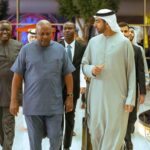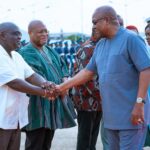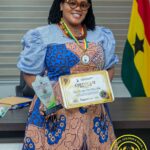Mr Olatunde Olayemi, the Programme Officer, Social Dimension of Anti-Human Trafficking, ECOWAS Commission, says it is crucial that women’s full participation in peace processes is realized.
Without it, he said there cannot be sustainable development in any region.
The peace processes, he added included ensuring gender mainstreaming in peace and security and addressing the disproportionate impact of conflicts on women and girls.
He made the remark on Monday at the opening of a five-day “Strategic Leadership Workshop for ECOWAS Women in Peace and Security (WPS) Regional Steering Group” in Accra.
The overall objective of the workshop is to enhance the strategic leadership and coordination capacity of national WPS focal points to design and implement coherent, robust, and impactful national WPS systems.
Mr Olayemi noted that the adoption of the United Nations Security Council Resolution 1325 in 2000 and other Security Council Resolutions historically had amounted to a recognition of the unique challenges faced by women and girls in conflict situations.
At the end of the five-training capacity building programme, he said it was anticipated that participants would be equipped with leadership, negotiation and influencing skills relevant to managing complex, multi-actor Women, Peace and Security implementation processes.
The training, he said also aimed to strengthen stakeholder mapping, engagement and strategic communication competencies to improve coordination and advocacy outcomes; facilitate the alignment of national WPS mechanisms with regional and continental frameworks, and support participants in developing context-specific national coordination action plans in all member states.
Dr Agnes Naa Momo Lartey, the Minister of Gender, Children and Social Protection, said the gathering had remained the main foundation of the women, peace and security agenda globally.
“I am happy to inform you that Ghana commemorated this landmark anniversary with a press briefing held on Friday 30th October 2025 on the theme, Empowering Women as Agents of Peace, Strengthening Community Resilience through Inclusive Leadership”.
She said the event provided an opportunity to reflect on Ghana’s achievements and progress in the implementation of the UNSCR 1325 and deliberate on strategies to address the evolving security threats confronting the world today.
Ghana, the Minister said continued to demonstrate leadership in advancing the women, peace and security agenda on the continent, with remarkable progress in promoting women’s participation, protection and leadership in peace and security processes.
These included the passage of the Affirmative Action Gender Equity Act 2024 Act 1121, which provides a solid legal framework to promote gender equity across all sectors, including security and governance.
Dr Lartey said there was also appointment of gender focal persons across the Ghana Armed Forces, Ghana Police Service, Ghana Immigration Service and the Ghana Prison Service to integrate gender perspective into operations, planning and training.
It also includes the development and operationalisation of gender policies that promote inclusivity and equal opportunities within the security services, especially the Ghana Armed Forces, Ghana Immigration Service and the Ghana Police Service.
“Under the visionary leadership of His Excellency John Dramani Mahama, Ghana has witnessed the election of the first female Vice President of the Republic, who also serves as the first female chairperson of the Ghana Armed Forces Council,” she added.
The Minister said the step was monumental for gender inclusivity and national defence and governance.
Dr. Dirk Aßmann, the Country Director, GIZ Ghana, said GIZ believed that lasting and sustainable peace was only possible when women participated meaningfully at all levels of decision making.
Advancing gender equality, he said, was therefore not only a matter of rights, but a prerequisite for stability, conflict prevention and resilient societies.
“This is why the ECOWAS Peace, Security and Governance Project promotes inclusive and evidence-based policy approaches that place the voices of women and youth at the centre of peace building and conflict prevention,” he added.
Dr. Aßmann commended the ECOWAS Commission for its sustained leadership in advancing the women, peace and security agenda across the West African region.
“Together with our commissioning parties, we stand behind the Continental Resource Framework and the ECOWAS Regional Action Plan for Women, Peace and Security because we are convinced that these are essential tools for monitoring progress and increasing accountability across member states,” he added.
Participants for the workshop were WPS Focal Points from ECOWAS Member States, ECOWAS DHSA and other relevant technical Directorates and Agencies, Training Centres of Excellence, Civil society and regional women’s networks (FemWise, NOPSWECO, WANEP, ROAJELF)
The workshop under the ECOWAS Peace, Security and Governance (EPSG) Project is commissioned by Germany, co-funded by the European Union, and jointly implemented by Deutsche Gesellschaft für Internationale Zusammenarbeit (GIZ) GmbH, Expertise France (EF), and Fundación para la Internacionalización de las Administraciones Públicas (FIAP) in partnership with the ECOWAS Commission.
GNA


















